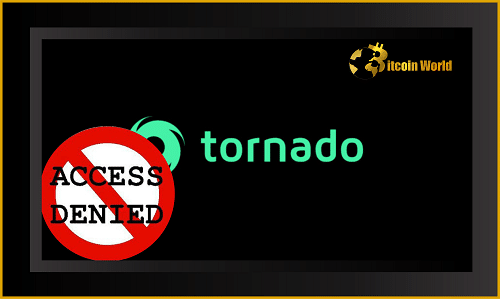The cryptocurrency world was recently shaken by a significant event: the U.S. Treasury Department’s sanctions against Tornado Cash. This move has sparked a heated debate about privacy, regulation, and the future of decentralized finance (DeFi). Let’s dive into what happened and why it matters.
Why Was Tornado Cash Sanctioned?
The core reason behind the sanctions is the allegation of money laundering. The U.S. Treasury claims that Tornado Cash, a popular cryptocurrency mixer, facilitated the laundering of over $7 billion in cryptocurrency since 2019. This includes a substantial $455 million linked to the Lazarus Group, a notorious hacking organization with ties to North Korea.
Think of Tornado Cash as a digital blender for cryptocurrency. It obscures the transaction history, making it difficult to trace the origin and destination of funds. While this can be used for legitimate privacy purposes, authorities argue it’s also a haven for illicit activities.
The Immediate Fallout: Alchemy, Infura, and Circle Take Action
Following the sanctions, major players in the crypto infrastructure space quickly responded:
- Alchemy and Infura: These platforms, which provide crucial infrastructure and API access for Ethereum-based applications, blocked access for Tornado Cash users. This effectively cut off a significant pathway for interacting with the mixer.
- Circle: The issuer of the USD Coin (USDC) stablecoin froze funds held within Tornado Cash’s smart contracts. This action directly impacted users who had USDC locked within the platform.
These actions highlight the centralized nature of certain key components within the supposedly decentralized crypto ecosystem. When regulators take action, these centralized entities can quickly enforce compliance.
The Privacy Argument: Was the Sanction Justified?
The sanctions have ignited a passionate discussion about the right to privacy in the digital age. Even Ethereum co-founder Vitalik Buterin publicly stated that he used Tornado Cash to donate to Ukraine. His reasoning? To protect the financial privacy of the recipients from potential interference by the Russian government.
Buterin’s example underscores a crucial point: privacy tools can be essential for legitimate purposes, especially in sensitive situations. Imagine activists in authoritarian regimes needing to receive funds without being tracked, or individuals wanting to keep their financial dealings private for personal safety.
The Dark Side: How Tornado Cash Was Exploited
Unfortunately, as the U.S. Treasury alleges, Tornado Cash was also exploited for illicit activities. It became a go-to tool for anonymous hackers to launder funds obtained through various cybercrimes, particularly those targeting cross-chain bridges.
Consider this:
- Cross-Chain Bridge Exploits: These bridges, designed to facilitate the transfer of assets between different blockchains, have become a prime target for hackers.
- Laundering the Loot: Once stolen, these funds often flowed through Tornado Cash to obscure their origin, making it incredibly difficult for law enforcement to recover them.
- Significant Losses: Reports indicate that over $2 billion has been stolen from these applications this year alone, with Tornado Cash playing a role in laundering a significant portion of it.
The Balancing Act: Security vs. Privacy
The Tornado Cash situation highlights the ongoing tension between security and privacy in the cryptocurrency space. How do we prevent illicit activities without infringing on the privacy rights of law-abiding users?
Here’s a breakdown of the challenges:
| Challenge | Description |
|---|---|
| Illicit Use | Anonymity tools can be exploited for money laundering, terrorist financing, and other criminal activities. |
| Privacy Concerns | Blanket bans can impact legitimate users who rely on privacy for various reasons. |
| Technological Limitations | Developing solutions that effectively distinguish between legitimate and illicit use is technically complex. |
| Decentralization vs. Regulation | Regulating decentralized technologies poses unique challenges. |
Moving Forward: Finding the Right Path
The Tornado Cash sanctions serve as a wake-up call for the crypto industry. It’s clear that regulators are paying close attention and are willing to take decisive action. So, what’s the way forward?
Here are some potential avenues:
- Enhanced KYC/AML Practices: Strengthening Know Your Customer (KYC) and Anti-Money Laundering (AML) protocols within the crypto ecosystem is crucial.
- Technological Solutions: Exploring and developing privacy-preserving technologies that also allow for compliance with regulations (e.g., zero-knowledge proofs).
- Industry Collaboration: Open dialogue and collaboration between regulators, developers, and users are essential to finding balanced solutions.
- Clear Regulatory Frameworks: Establishing clear and consistent regulatory guidelines can provide clarity and encourage responsible innovation.
Conclusion: A Turning Point for Crypto Privacy?
The Tornado Cash sanctions mark a significant moment in the evolution of cryptocurrency. It underscores the ongoing battle between the desire for privacy and the need for regulation to combat illicit activities. While the immediate impact has been the blocking of a specific tool, the broader implications are far-reaching.
This situation forces us to consider fundamental questions about the balance between individual privacy and collective security in the digital age. The path forward will require careful consideration, innovation, and collaboration to ensure that the promise of decentralized finance can be realized responsibly.
Disclaimer: The information provided is not trading advice, Bitcoinworld.co.in holds no liability for any investments made based on the information provided on this page. We strongly recommend independent research and/or consultation with a qualified professional before making any investment decisions.




